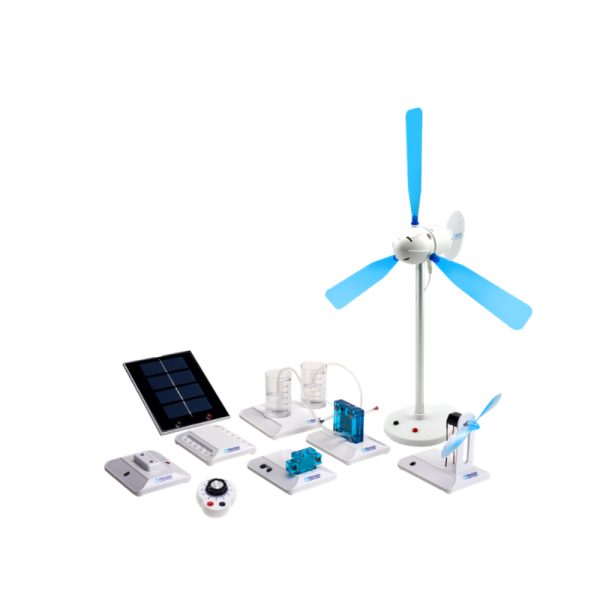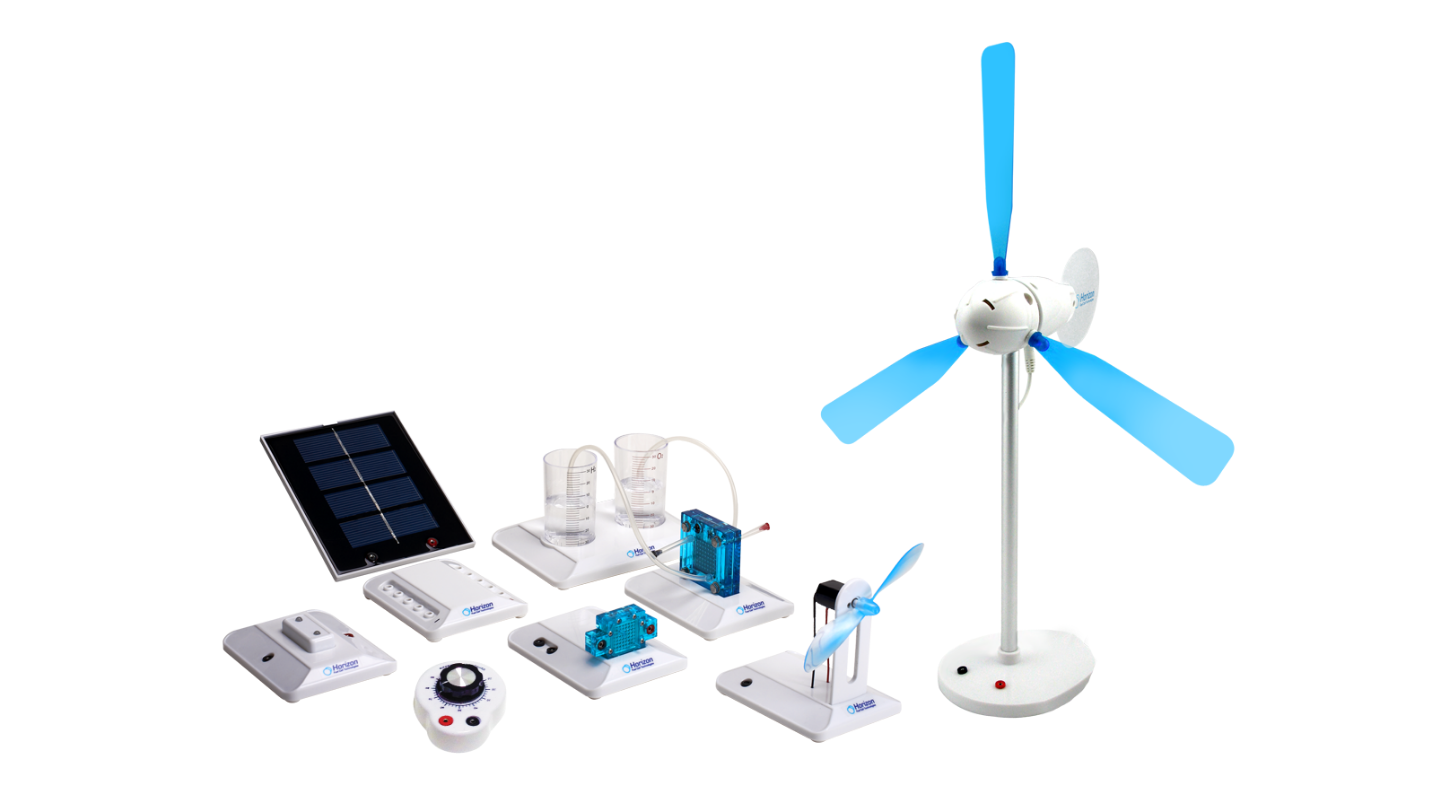
Renewable Energy Science Education Kit 2.0
The Renewable Energy Science Kit demonstrates the workings of a clean energy technology system on a miniature scale. Power an electrical circuit by solar panel or a wind turbine with profiled blades based on NASA aeronautics.
Renewable Energy Science Kit - product overview
The Renewable Energy Science Kit demonstrates the workings of a clean energy technology system on a miniature scale. Power an electrical circuit by solar panel or a wind turbine with profiled blades based on NASA aeronautics. Generate hydrogen through water electrolysis and convert it into electricity using a PEM fuel cell. Whichever combination of technologies you want to explore, this science kit is a comprehensive introduction to the principles behind renewable microgrids.
- Full PBL unit on clean power generation includes an exploration of the environmental effects of atmospheric carbon dioxide.
- Hands-on activities center on complementary attributes of different renewable energy sources.
- Complete student and teacher materials for up to 10 class periods of activities.
Experiments
Experiment 1: Use a solar panel to power the LED module
Experiment 2: Use the solar panel to power the small fan/wheel motor module
Experiment 3: Preparation of the electrolyzer module and solar powered hydrogen production
Experiment 4: Using a PEM Fuel Cell to power the LED module
Experiment 5: Using a PEM Fuel Cell to power the small electric fan module
Experiment 6: Using a PEM Fuel Cell to power the samll car wheel module
Experiment 7: Using a PEM Fuel Cell to power the small fan/wheel motor and the LED module in parallel
Experiment 8: Using a wind turbine to power the LED module
Experiment 9: Preparation of the elecrolyzer module and wind powered hydrogen production
Experiment 10: Using the battery pack to perform electrolysis (in case of no sun or wind)
Renewable Energy Education
Renewables are revolutionizing not only the energy industry as we know it, but also science classrooms across the world. Alternative technology is an opportunity to open kids’ eyes to a whole new world of scientific discovery as well as teach fundamental principles in a new way. Let’s take a look at just some of the advantages of integrating renewable technology into the curriculum.
Today’s Technology
Major industrial nations already source an enormous amount of their energy from renewables, with countries like the UK and Germany generating as much as 15% of their power needs with alternative technology. Energy grids of major cities are now supported by localized micro grids and smart grids using renewables. Then there are major automotive companies like Hyundai, GM and Toyota, as well as smaller innovators like Arcola Energy, creating hydrogen fuel cell hybrid and electric cars. Both the EU and US states such as California are investing in a comprehensive renewable refueling station infrastructure, while telecoms in India look to renewables to provide more reliable power generation. Renewables are all around us and becoming an increasingly important part of our lives—what better way to illustrate the direct relevance of science to the real world.
Teach Key Principles
Teaching renewable energy not only opens up a whole new world of energy generation, but also introduces some basic scientific principles. Renewable technology is a practical example of the principle of energy conversion, taking energy from the wind or sunlight and converting it into electrical energy or storing it as hydrogen. Connected to this is the principle of energy conservation— renewables are a great opportunity for students to measure energy loss as it is converted and stored. Then there’s the classic electrical circuit, Horizon education kits contain propellers and LEDs to demonstrate the effectiveness and efficiency of power generated from renewables.
Inspire
Wind turbines, solar panels, fuel cells and all the equipment involved in teaching renewable science naturally capture the imaginations of young minds. Students can experiment with the effects of shade on solar panels, measure wind resistance on turbine blades, try out different kinds of fuel cell to see which is the most efficient and compare metal hydrides with hydrogen generated from water electrolysis. The experiments are directly practical, involve fascinating, engaging technology while still teaching those key electrochemical principles.
Renewables are a multi-faceted tool for science teachers. They are Ideal for getting young minds excited about science, more interesting and versatile for science teachers to create engaging lessons and directly relevant to the technology innovations happening all around us. In the quest to inspire the next generation of physicists and chemists, renewable energy science equipment is a great place to start.

Curriculum
What is included in the horizon energy curriculum? The lab equipment is just the beginning. We’ve built the horizon energy curriculum to provide teachers with multiple resources for engaging their students.
Materials provided
- Hands-on Lab Activities
- Teacher's Guides
- Student's Guides
Concepts covered
Chemistry Concepts
Electrolysis, Energy, Hydrogen Generation, Reaction Rates, Reaction Yield, Reactions, Redox Reactions, Semiconductors, Stoichiometry
Physics Concepts
Angular velocity, Classical Mechanics, Efficiency, Electric Circuits, Energy, Ohm's Law, Parallel Circuits, Power (Electric), Rotational Mechanics, Series Circuits
Earth Science Concepts
Climate change, Renewable Energy, Human Impact
